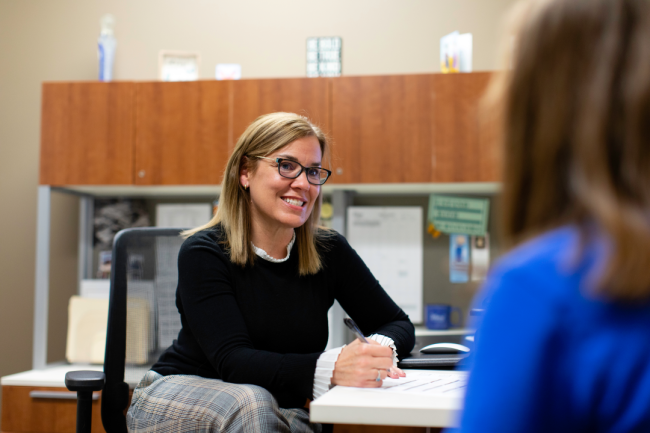You have /5 articles left.
Sign up for a free account or log in.

Student Success personnel at Jesuit institutions are gathering regularly to discuss best practices in retention and persistence, as organized by Mary Ann Tietjen, senior director of the student success center at Creighton University.
Creighton University
Student success roles are growing in depth and importance at institutions around the country, with higher education placing a greater value on retention and persistence against skepticism of the benefits of a college education.
Straddling academic and student affairs departments to prioritize the student experience, student success professionals find themselves in an isolated middle ground of departments and professional organizations.
The Student Success and Retention Conference of the Association of Jesuit Colleges and Universities gathers, virtually and soon in person as well, student service professionals from across a dozen-plus institutions in the U.S. Their common mission: create community and promote holistic student support.
Seeking colleagues: Mary Ann Tietjen serves as senior director of the student success center at Creighton University in Omaha and, in 2021, was looking to connect with fellow student success and retention leaders.
“I was having a hard time finding my network of people at universities,” Tietjen says. “I saw that our financial aid director had her networking group, I could see that our director of the career center had his networking group, and I was unable to pinpoint the role at universities where I was sitting.”
So, Tietjen started her own network.
Building community: She found colleagues by reaching out to people over email with similar-sounding roles at sister institutions and quickly expanded among colleagues in the Jesuit space.
In December 2021, Tietjen and 16 other student success professionals from 13 Jesuit institutions met over Zoom, the start of what is now the AJCU Student Success and Retention Conference, officially recognized this January.
“We had some specific outcomes from that first meeting, and the first [outcome] was: this is a good thing, and let’s keep meeting,” she says.
Now, the group is about 34 members strong, representing 19 institutions with staff from career services, advising, learning centers and student affairs.
“When we come together, it really is a more holistic care of the student. As Jesuit schools, we talk a lot about cura personalis as one of our Jesuit values, of care for the whole person,” Tietjen says.
Growing together: Members meet quarterly to discuss student success topics and best practices as well as establish their inaugural in-person meeting.
“I have found it to not be a competitive environment,” Tietjen says. “When students are the center and the focus of your work—which it is—that that makes it easy to connect and share.”
Student success ties back to their faith-based institutional missions, Tietjen says. “It’s much more than just head count—it’s that commitment to our mission, that our institutions exist for students.”
The group often discusses supporting first-generation, Pell-eligible and underrepresented minority students, as many members work at predominantly white institutions.
The group serves as a launching point for professionals to connect and learn with colleagues and then implement plans at their own institution, which they can in turn measure and evaluate, Tietjen says.
“We are measuring, we are monitoring data,” Tietjen shares. “I think there is that time stamp of, at this point in time we started in that work, so now going forward, are we looking at our data? And are we seeing that our efforts as a collective group are moving the needle back in our home institutions?”
Getting off-line: The group will host its first in-person event in June at Rockhurst University in Kansas City directly following the National Association of Student Personnel Administrators (NASPA) June Success Conference.
Topics include using data, messaging to students, retention and persistence strategies, involving students in student success, and initiatives for Black, Indigenous and people of color (BIPOC), Pell-eligible, and first-gen students.
Seeking stories from campus leaders, faculty members and staff for our Student Success focus. Share here.








